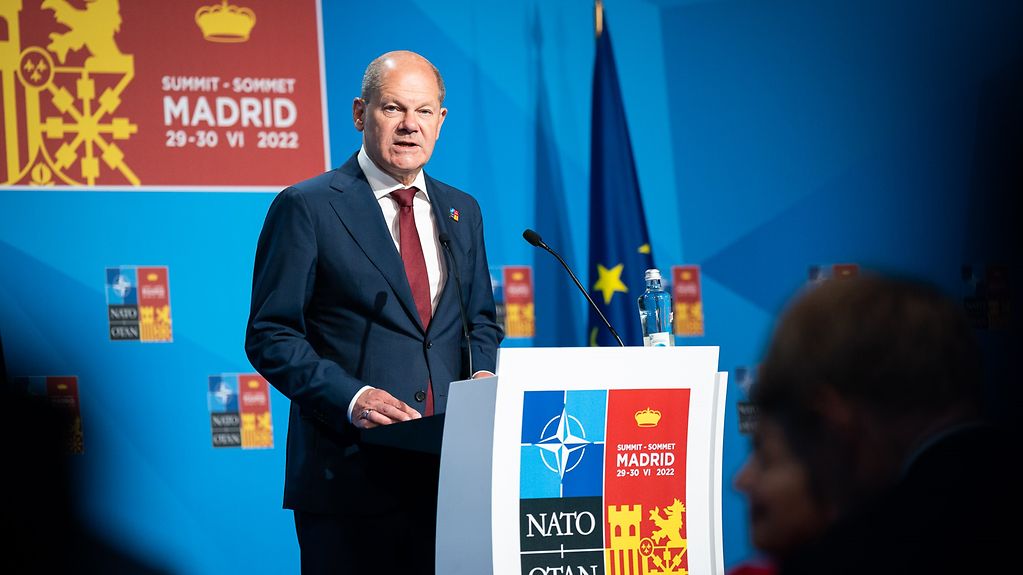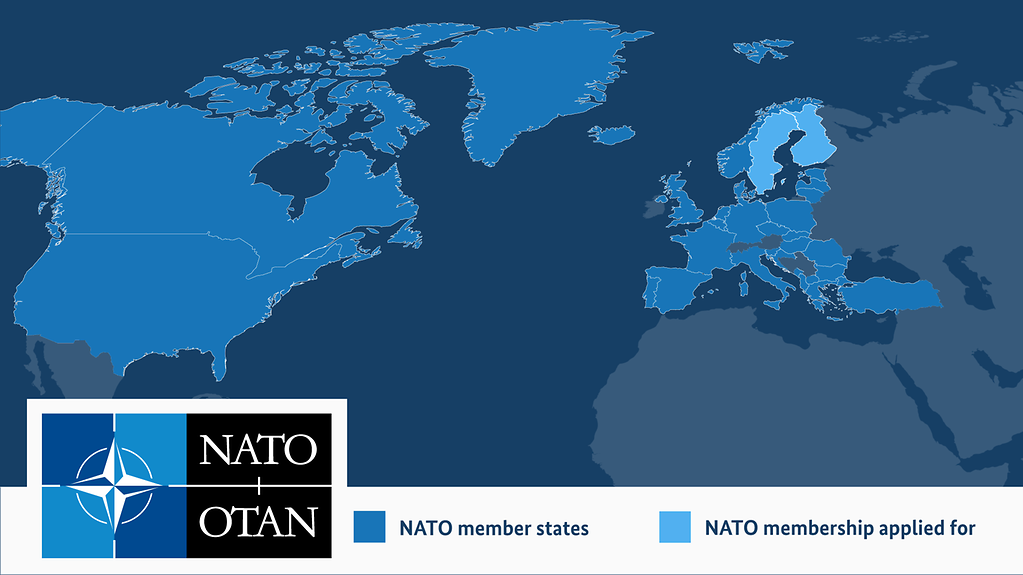Scholz at the NATO summit in Madrid
Two key outcomes of the NATO summit in Madrid were the adoption of a new Strategic Concept and agreement on accepting Finland and Sweden as members. Federal Chancellor Scholz emphasised the importance of the alliance for security in Europe and peace around the world. Scholz stressed how the allies were firmly united, and this had been evident in Madrid.

After the NATO summit, Federal Chancellor Scholz updated the press on what had been achieved.
Photo: Federal Government/Kugler
At the end of the NATO summit in Madrid, Federal Chancellor Scholz stressed the unity of the defence alliance. NATO is an organisation of “30 states (and soon to be 32) which stand together under the motto of ‘All for one and one for all’,” Scholz said. The allies would risk “life and limb to hasten to one another’s aid,” the Federal Chancellor added, praising the tangible sense of this spirit during the meetings and encounters in Madrid – “and that’s a great feeling.”
The Federal Chancellor also noted that “NATO has not been this important for many years with regards to our security, the security of Europe and peace around the world.” Russia’s war of aggression against Ukraine had left the “peace order of recent decades in ruins,” Scholz said. From border security to peaceful mechanisms for resolving conflicts and treating one another in a civilised way, “much of what we once took for granted in the world is now at risk.”
Strategic concept adopted
By adopting its new Strategic Concept, NATO had drawn the right conclusions from the altered geopolitical situation, Scholz said, adding that it confirmed the unchanged core role of the alliance, which was to defend the treaty area and the mutual guarantee of collective defence. “What’s new is how we see Russia,” Scholz said. Russia’s aggressive policies were a threat to NATO, “and they also put the international order at risk.”
Enhanced contribution from Germany
In the light of the new situation, the alliance was boosting its defence capacity, particularly with a view to its eastern border, said Scholz. The Federal Chancellor stressed that Germany was “expanding our presence in the Baltic, Poland, Romania, Slovakia and the Czech Republic.” In future, 300,000 troops will be at increased readiness to respond as a rapid reaction force.
Scholz pledged Germany’s substantial involvement in this, particularly by deploying a combat brigade to Lithuania. He also stated that Germany would keep an armoured division of 15,000 troops, along with up to 20 ships and 60 aircraft in heightened readiness for Northern Europe. This would, he said, allow NATO’s armed force structure to adapt to the new situation and make it possible to respond swiftly to threats. Given Germany’s central position in Europe, Scholz said Germany would continue to make a major contribution to the alliance’s defence capabilities through Germany’s role as a logistics hub.
Invitations to Sweden and Finland
The summit also approved official invitations to Sweden and Finland to join NATO after the two countries had applied for membership. Federal Chancellor Scholz announced that Germany would get the ratification process underway quickly and “conclude it very swiftly.” He pledged that Germany would come to the aid of both countries even before the formal process had been concluded.

NATO has officially invited Sweden and Finland to join the alliance.
Photo: Federal Government
Ongoing support for Ukraine
Ukrainian President Zelensky joined the NATO summit via video link, where he reported on the situation in his country. The Federal Chancellor stressed that almost fifty countries were providing individual support for Ukraine. He added that NATO was offering “very practical” non-lethal support to Ukraine through the existing cooperation. Scholz added that provisions had been adopted “to ensure longer-term support in the area of security.”
At the beginning of the summit, the Federal Chancellor reaffirmed financial and humanitarian support for Ukraine, and also in the form of supplying arms. “We will continue to do this for as long as is needed and with the necessary intensity so that Ukraine can defend itself.”
The Federal Chancellor also held several rounds of bilateral talks on the fringe of the summit. For the first time, NATO’s Asia Pacific partners of Japan, Korea, Australia and New Zealand were represented at a summit.
NATO summits are meetings at the highest level within the alliance and are not held at regular intervals. For the NATO summit in Madrid, the heads of state and government of the 30 member states met to conduct important discussions and take key decisions together.
Further information can be found on the NATO summit website.
The website of the Federal Ministry of Defence provides background information on the defence alliance.
NATO has set up a website dedicated to the new Strategic Concept.